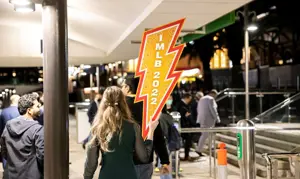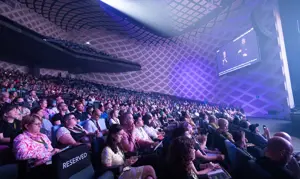AI and Australia's Talent Pool

Worldwide spending on artificial intelligence (AI), including AI-enabled applications*, infrastructure, and related IT and business services, will more than double by 2028 when it is expected to reach $632 billion, according to a new forecast from the International Data Corporation.
As a result, talent with skills in AI are a hot commodity, and there is an alarming shortage in the sector. Demand is certainly outstripping supply and the pressure is on to produce the talent fast enough to underpin rapid growth.
With our own Tech Sector growth strategy in mind, BESydney CEO, Lyn Lewis-Smith recently joined the Trans-Tasman Business Circle’s #womenintechontour to San Francisco and Silicon Valley to gather some deeper intelligence around the skills and talent attraction strategies of US multi-national corporations.
It was incredible to witness first-hand the role this tech hotspot plays in influencing the agenda for tech talent globally.
It goes without saying that Silicon Valley has access to capital and talent that is remarkably unique. Global tech leaders are just a hop, skip and a jump apart. The buzz is palpable – and reputations are a major talent magnet. These are big brands that have considerable leverage in today’s corporate, social and environmental spheres.
As we moved seamlessly between briefings with CISCO, Salesforce, Amazon and many future unicorns in-between, the consistent thread throughout, above all else, was the absolute priority placed on their people: attracting them, developing them, and retaining them.
We heard from Uber about their enticements for STEM graduates. We heard from Cisco about building culture to integrate ‘new collar workers’ – which for IBM Watson meant moving its focus from degrees to skills, and ongoing entrepreneurial and vocational training for employees. These are innovative and future-focussed strategies, with people (as talent) and culture at the centre.
We observed how this destination and its business community adapts organically and rapidly to emerging trends in order to remain at the forefront of the talent attraction and retention battle. If Sydney is to deliver on its tech potential, we need a similar agility in our talent attraction activities, and an acknowledgement of the role of our nation’s business brand in getting Australia as a compelling option in the first place.
The quest for people with skills is being hard-fought in the trenches, and those of us in the business of promoting Sydney (and Australia) to the world need to bring on our marketing A-game if we are to have any hope of remaining relevant. We’ve talked about it (great stuff in the Committee for Sydney’s 2018 report on Sydney as a Global Talent hub):
“Access to global talent plays a vital role in the success of any economy, especially one [transitioning and] with knowledge gaps and an ageing population. Talent performance is seen as a critical factor to growth and prosperity.”
But, with Australia ranking 12th on this year’s Global Talent Competitive Index, now we need to get on with it. As I see it, there are five key areas Australia needs to address in order to develop its talent pool:
- Governments need to invest in better, more relevant, education programs from primary school through to tertiary education.
- Education Institutions and business need to work together to fast track talent
- Society needs to help those who will feel the brunt of the immediate changes - reskilling the generation that is undergoing the shift towards ‘new collar’ skills.
- Attract global talent. A recent LinkedIn study showed there is a 150,000 talent deficit of data scientists and engineers in the US so what hope does Australia stand in attracting the global talent required to shape our future?
- Company boards need to reflect the talents and skills that they are trying to attract to avoid a culture and strategy disconnect.
Five years’ worth of BESydney secured global meetings bring an estimated 300,000 delegates to Sydney. An incredible mix of thinkers, leaders, experts and emerging talent already predisposed to develop their skills, create industry progress and contribute to global conversations.
BESydney’s research with UTS surveyed 1,000 global meeting delegates across multiple industries to seek feedback on their desirability to live, work and study in Sydney: 41% of delegates wanted to live/work/study in Sydney and 7% were in the process of applying. Global meeting attendees are a ripe opportunity currently being overlooked – all it would take is a collaborative effort by governments, industry and academia to move visiting talent from interested to converted.
Looking ahead at the BESydney pipeline of upcoming events, the world’s best in robotics, AI, health services, agriculture and energy innovation are on their way here. What is being done to leverage this untapped opportunity?


